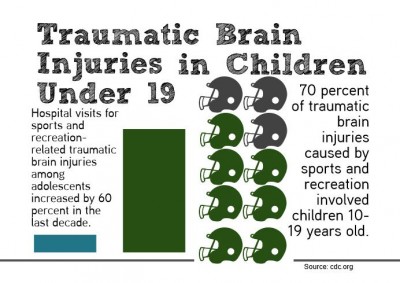
Former NFL football players who played tackle football before the age of 12 may be more susceptible to cognitive development and memory impairment issues later in life, according to a Wednesday study by researchers at Boston University School of Medicine published in the journal “Neurology.”
The study supports the idea that children whose brains are rapidly developing should not be hitting their heads over and over again in contact sports such as football, said Julie Stamm, the lead author of the study.
“We found that even after accounting for the total number of years they [the former NFL players] played football, those who began playing before age 12 performed significantly worse on all tests we measured, suggesting that being hit in the head repeatedly through tackle football during a critical time of brain development is associated with later-life cognitive difficulties,” she said in an email.
Study participants were all former NFL players, but that does mean that the findings are not applicable to other athletes, the study stated. More research will be needed to determine the effects of cognitive development and impairment for other sports, those at different competition levels and female athletes, Stamm said.
BUSM is working with psychiatric researchers Martha Shenton and Inga Koerte at Brigham and Women’s Hospital are using advanced neuroimaging techniques to examine whether there is a relationship between playing football and differences in brain structure later in life, Stamm said.
“We have great hope for the future of youth sports, including football,” she said. “Participation in sports can have so many important benefits, including the development of leadership skills, social skills and work ethic, not to mention the health benefits. Our goal is to make sure that children can take advantage of all of the benefits of sports participation without the risk of cognitive difficulties later in life.”
John McCarthy, a clinical assistant professor and director of BU’s Institute for Athletic Coach Association, said the study is a good start to research the implications of sports head injuries.
“The authors of the study themselves point out that it is too early to make broad or even specific recommendations, but it appears they have established [a] link between loss of function and early [before age 12] head trauma,” he said in an email. “To me, it means that further study of the impacts of concussions and sub-concussive hits on the developing brain are even more urgently needed.”
Noel Coleman, a senior in the College of Communication, has played rugby at BU for the past three years. She said the information was concerning, considering how common it is for children to play contact sports like football.
“The healthcare professionals I interact with are very concerned with my exposure to concussions, so I would imagine that with younger athletes, the concern should be the same, if not greater,” she said. “When I learned to tackle for rugby … we talked a lot about proper tackling technique and very specifically how to keep your head out of it.”
Although she said she has not experienced any head injuries while coaching youth rugby, Coleman said rugby is a full-contact sport that puts players at risk for concussions.
“Our athletic training staff is informed on the topic and really works to educate our teams on how to recognize symptoms and get them reported,” she said. “Furthermore, studies like this will make people more cautious about letting kids start contact sports at a young age, but I hope that it also sparks a conversation about how we’re teaching kids to play these sports.”
Alessandro Sclapari, a sophomore rugby player in the College of Arts and Sciences, said although football and rugby are different, injury is still a strong possibility.
“Even though rugby is better than football because of the tackling technique, rugby has become more hard-hitting than ever and a lot of players suffer repeated concussions,” he said. “Contact sports need to start thinking of new rules or penalties to avoid head injuries even though that may go against the nature of the sport.”
Several students said they were interested in the results of the study, but they are not sure what will be done with the findings.
Lilla Simon, a freshman in CAS, said though she does not have experience with contact sports, she is familiar with the health concerns associated with contact sports and athletics in general.
“This is information I have been aware of,” she said. “The brain continues to develop through the age of 20, so playing contact sports before then can have a significant impact on cognitive development. There is a lot of pressure on athletes nowadays to perform, and people tend to forget the risks associated with that.”
Erin Deadmon, a senior in CAS, said she was not surprised about the study because concussions in contact sports are not unusual.
“Studies such as this one are going to have to dig a bit deeper to make an impact on contact athletics,” she said. “I know that there are measures currently in place and measures that will soon be in place to limit contact among younger children, but because contact sports are such a huge part of American culture, it’s going to take awhile before any big changes happen.”






















































































































